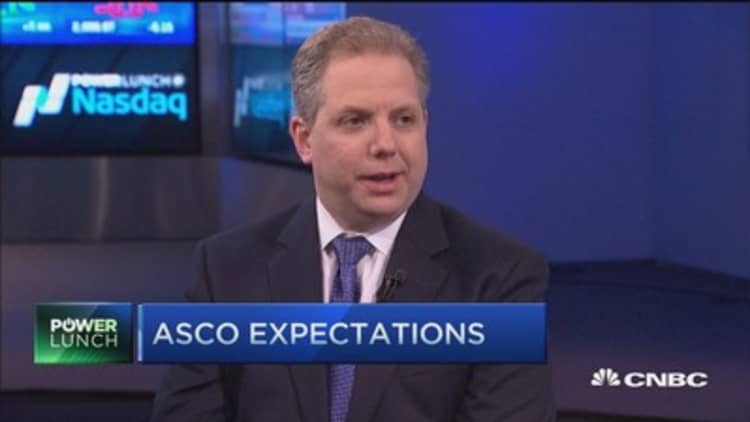
The biotech investing world will be glued to their computers Wednesday afternoon. About 5,000 datasets will be released simultaneously at 5 p.m. EDT, ahead of the world's biggest cancer research conference, the American Society of Clinical Oncology meeting.
The abstract drop, as it's known, has implications for companies large and small. Here's what analysts are watching.
Immunotherapies will continue to be the hot topic at this year's ASCO meeting, held May 29 to June 2 in Chicago. These medicines harness the immune system to fight cancer.
Since last year's ASCO, two new immunotherapies have been approved, Merck's Keytruda and Bristol-Myers Squibb's Opdivo. Analysts are expecting new data both on those medicines and others in the pipeline, specifically from Roche, AstraZeneca and Pfizer.
Immunotherapies
Cowen's Steve Scala highlights a showdown between Merck's Keytruda (also known as pembrolizumab) and AstraZeneca's similar experimental medicine, known as MEDI4736, in head and neck cancer.
"Key is whether MEDI4736 can achieve similar efficacy compared to Merck's pembro but with a better toxicity profile," Scala wrote in a Wednesday preview note. "The ASCO update should indicate whether AstraZeneca or Merck has the lead in head and neck cancer," Scala wrote. That's important because it's likely the first type of cancer outside of melanoma and lung cancer for which Merck will file for approval.
Scala also highlighted several studies of Bristol-Myers' Opdivo, also known as nivolumab, in renal cell carcinoma and nonsmall cell lung cancer. A study in the latter indication was stopped early for positive efficacy in January, "but this is the first time that we see full data," Scala wrote.
Read MoreSpending on this type of meds hit a new milestone
Alex Arfaei at BMO Capital Markets predicts "Bristol will emerge from ASCO as the leader in the large nonsmall cell lung cancer market with two high profile Opdivo phase 3 presentations." He expects Bristol's total immuno-oncology sales to top $16 billion in 2023.
Analysts are also watching studies of combinations of these drugs in areas like melanoma, the first cancer type in which they showed remarkable results.
Other forms of immunotherapy will be on display as well, notably in a class called CAR-T, for chimeric antigen receptor T-cell therapy. Those therapies, in development at Juno Therapeutics, Novartis, Kite Pharma, Bellicum and others, involve removing a patient's immune cells from the body, better equipping them to detect and fight cancer, and then re-infusing them. The technology has shown remarkable results in patients failed by other treatments, but the programs are early in development and have been limited so far to cancers of the blood.
Read MoreIs this hot biotech the next Genentech?
Analysts are looking at updates on Juno's JCAR015 and JCAR014 at ASCO, two of the young company's most advanced programs. Both are in blood cancers; Juno is expected to move into solid tumors like brain and ovarian cancer in the next year.
Another lung cancer battle
The David and Goliath showdown between AstraZeneca and smaller biotech Clovis Oncology continues this year in lung cancer, with data on the companies' medicines (Clovis' rociletinib and AstraZeneca's AZD9291) scheduled to be presented back to back at the conference on May 31, Leerink Research pointed out.
Investors will also be watching Clovis for updates on its ovarian cancer drug, rucaparib.
Multiple myeloma
Normally the focus of another medical meeting, ASH (American Society of Hematology), drugs for multiple myeloma have a solid showing at ASCO this year. Analysts are looking at a head-to-head study of Amgen's Kyprolis versus Takeda's Velcade in the blood cancer, which Leerink said could drive use of Kyprolis and "create wider physician awareness of the data."
Read MoreMedicaid: A few people cost a whole bunch of money
Analysts are also watching a late-stage study of elotuzumab, an experimental drug being developed by AbbVie and Bristol-Myers in multiple myeloma that has breakthrough therapy designation from the Food and Drug Administration.
"Key is whether or not phase 2 data is replicated in phase 3," Cowen's Scala wrote. "Our clinical consultants view elotuzumab favorably given its ability to induce long progression-free survival."
Breast cancer
The smallest companies are always the biggest stock movers out of ASCO, and this year analysts are watching Puma Biotechnology and its breast cancer drug, neratinib.
"Puma continues to be very confident that the data will not disappoint," Citi analyst Yaron Werber wrote in a May 5 research note. "The data has now been vetted internally by management, externally by key opinion leaders, by FDA, and by potential acquirers."
As a potential takeover target, Puma could be even more volatile based on its ASCO data, analysts said. Werber said he expects the stock to trade up 10 to 20 percent on positive data, "as this could boost confidence in a deal."
Pfizer will also be in the spotlight at ASCO, with its recently approved breast cancer drug Ibrance. Analysts are watching data from a potential competitor, Eli Lilly's abemaciclib, in metastatic breast cancer; BMO's Arfaei says he doesn't expect Lilly's drug "to be meaningfully differentiated."
Arfaei estimated Pfizer's Ibrance could draw $678 million in 2015 revenue, with peak sales of $7.8 billion in 2020.

